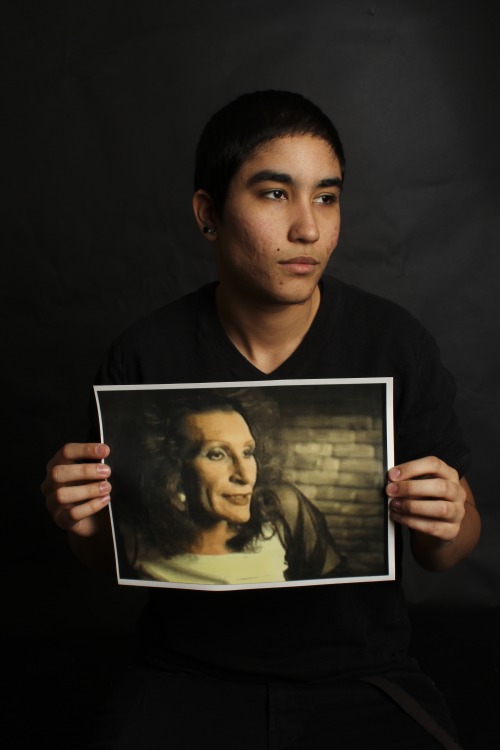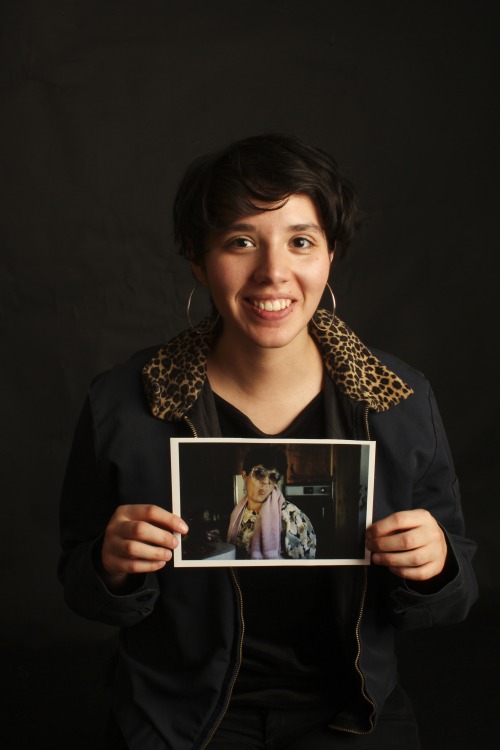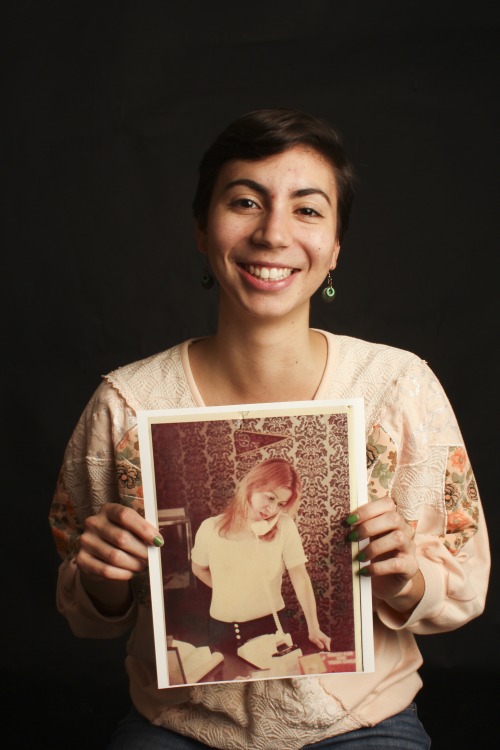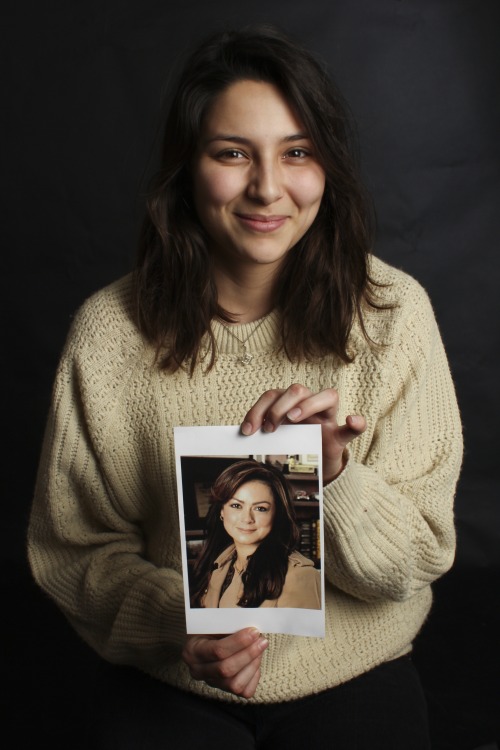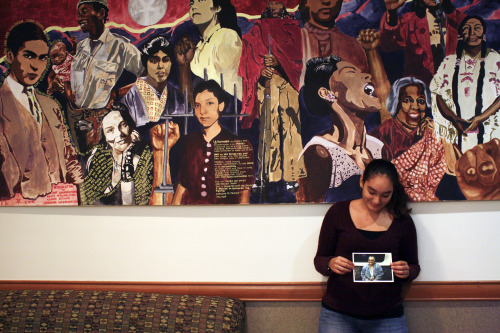oberlinlatinafeminisms:Femenistas Clandestinas: An Underground Feminims Photo ProjectWes RuizSylvia
oberlinlatinafeminisms:Femenistas Clandestinas: An Underground Feminims Photo ProjectWes RuizSylvia Rivera (1951-2002) was a Puerto Rican and Venezuelan trans and queer activist from New York City. She is well known for her influence in the social justice struggles of the 1960’s and 70’s, including the Gay Liberation Movement and Third World Liberation Movements. She participated in the Stonewall Riots and famously fought her way on stage at the 1970 Christopher Street Liberation March (soon to become the Gay Pride Parade) and called out the mainstreaming and destruction of the Gay Liberation Movement. Sylvia Rivera is a fierce reminder to live, think, feel and act complexly. From her complex experience as a person with multiple marginalized identities, she thought and fought back for queer and trans youth of color, especially those who were experiencing poverty and homelessness. She knew that even those who represent marginalized identities still had the capacity to perpetuate structural oppression. The self-proclaimed “feminists” who condemned her and used transphobic rhetoric to exclude her from participating in their activist circles were just as responsible for perpetuating patriarchy as anyone else. People with power and privilege decontextualized and appropriated social justice rhetoric to serve their own interests. They were mainstreaming liberation movements, moving from collectivity to privatization and subsequently separating the theory and struggle from the people who created it in the first place. These thoughts, the work and the actions of the most vulnerable populations were being turned around on them and used to exclude them. I remember Sylvia Rivera’s struggle and her unwavering commitment to truly radical, compassionate and complex activism when I feel helpless and alone. Her strength continues to be an inspiration for me to fiercely advocate for myself and other highly vulnerable communities, even if it seems no one will listen. She taught me how to create theory and action starting from my most intimate understandings of my own experience and deep love for my people. Victoria VelascoMy grandma Alicia migrated from Zacatecas, Mexico, to the barrio of Boyle Heights in Los Angeles in the 1970s. She was a survivor of domestic violence and a single mother of six children. Her 8th grade education in a rural school permitted her to work at several low-paying jobs while in the U.S. When I was a child, I was left in her care while my parents were at work. She would make me tacos de papa when she was feeling extra generous, and she would watch 1930s Mexican films whenever they would air on television. She would take me all around the city with her on the bus, since she didn’t own a car, and she would often tell me how much she missed her father and siblings who still lived on the ranch where she grew up in Mexico.In 2005, she lost her life to cancer, and her children, including my father, have since grown apart from one another without her unifying presence in their lives. When I remember my grandma, I remember a matriarch that spent so much energy loving me and teaching me about my (and her) cultural heritage. I remember a woman who worked the night shifts so that her children could be the first in their families to attend college. I recall a mujer that never spoke to me much about the history of physical & emotional violence inflicted upon her by her ex-husband, who fathered five of her six children, but I do remember her pride for being, as she would say, both a mother and a father. Her life is a powerful embodiment of feminism for me because she taught me that we needed to reject the machismo found in my grandfather, my dad, and other men in our communities. She knew, as I do now, that it is the women who take up the reigns and fill the many gaps that Latino men often create.Ana RobeloMy Mom and my Mami. These mujeres are stubborn, focused, generous, and intelligent. They’ll tell you how it is but they know how to laugh, and know how to appreciate life. These are the women that taught me to be resourceful, to make use of home remedies, to buy things on sale, to pay attention, to pick things up quickly, to ask for the things I deserve, and to do things for myself. When I was younger, I remember going on long walks with Mami and having to work to keep up with her as she wound in and out of dirt paths with agility, pulling me over, under, and through. She would always make me eat lots of oranges, cut up with salt on the side. She’s healthy and put together, a Tica on a mission, a world traveler with serious cooking skills. While she’s reached a point of comfort now, she never forgets her home and the journey she made to Connecticut with her siblings to work and where she raised my mother by herself.My Mom has always shown me that it’s ok to leave things behind and start over, that as long as you have family and as long as you have yourself, it’s ok to be scared at first, you’ll adjust. While you may be pulled between places, you can take your home with you. As I go through college very far from home, I think of how my mom left for Costa Rica at 18 with only her broken Spanish to have her world turned upside down. A few years later she moved to Nicaragua with my father following the destruction of the revolution to join a new family.They have kept our family afloat time and time again. Even though they value the men in their lives, they have always known when to put up boundaries, when to put themselves first and assert their independence. While Mami and my Mom have their differences, they have survived together in this country and fulfilled their dreams of making connections and relationships beyond it. I hope I can match their courage and strength to do the same. Ashley SuarezShe is my manager, my mentor, my second mother. Yolie Aleman-Rodriguez is one of my biggest influences. With her story of oppression and resistance, she was able to open my eyes to the harsh realities of a heteropatriarchal society as well as the power of being your own person and finding happiness. Being a Latina woman, her family constantly reminded her of her assumed future: a house wife. After running away from a home that prevented her from being her own person, she discovered her strengths and has since then accomplished all of her goals. Named the 2012 Woman of the Year by Mujer, Inc., she has taught me to do what makes me happy because at the end of the day, I am the only person who matters.Jennifer MurdockThe woman who is my Latina feminist icon is my mom, Valerie. She grew up in the projects of El Barrio (NYC) and was the first one in her family to go to college. She’s now a lawyer and single mother, helping to put my brother and I through college. She always taught me to be myself and has always supported my dreams and always makes sure that no matter how I identify or what I do I am welcome and wanted at home. My mom has taught me that it’s okay to be silly while being hardworking, and that it’s okay to not always be confident and “strong.” I aspire to be even a quarter of the woman that my mother is. -- source link
#feminism#latina
